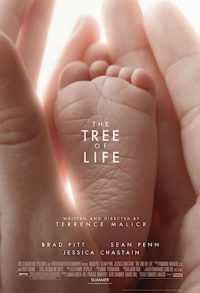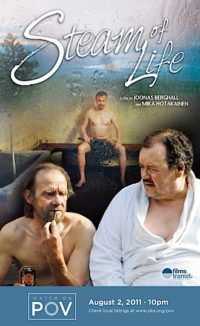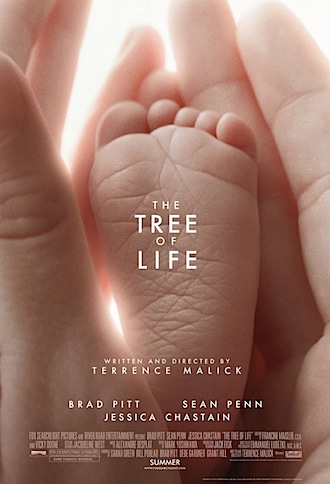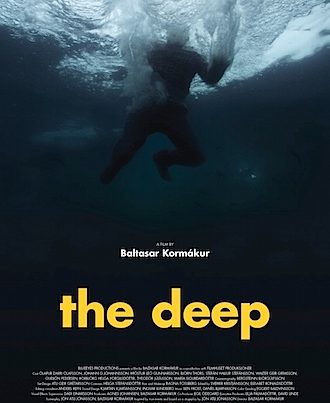 It’s the fifth anniversary of my first column for this paper – my, how time flies. Five years of searching – usually in vain – for some transcendence among the many flickering images in dozens of darkened rooms. And then, as if by magic, transcendence appears.
It’s the fifth anniversary of my first column for this paper – my, how time flies. Five years of searching – usually in vain – for some transcendence among the many flickering images in dozens of darkened rooms. And then, as if by magic, transcendence appears.
It has taken a few weeks – and a second viewing – to properly process Terrence Malick’s The Tree of Life. Often baffling, frustrating, unhelpful, yet emotional and evocative in ways I couldn’t put my finger on, I wrestled with it throughout the two and a half hour running time – searching for answers and meaning among the beautiful images, floating, soaring camerawork and weird diversions into cosmology and vulcanology.
Near the end I realised that I was doing it wrong. The Tree of Life isn’t a puzzle to be worked out – it’s a deeply personal hymn to the universe and to our unique place within it. It took a second viewing – one where I allowed myself to feel rather than think my way through it – before I could truly appreciate the wonder of Malick’s vision: grace and nature, the sacred and profane, the glorious and the banal are all equally cosmic and all equally precious. The Tree of Life will reward you more the less effort you put in.
 Friends will know that I occasionally compare Test cricket to Shakespeare (in this analogy One-day cricket is Chekov and T20 is more like Everybody Loves Raymond, but I digress). If I’m right then that period during the late 70s and early 80s – when the West Indies used their punishing battery of fast bowlers to force the rest of the game into a feeble submission – must have been Titus Andronicus. Talk about blood, boy!
Friends will know that I occasionally compare Test cricket to Shakespeare (in this analogy One-day cricket is Chekov and T20 is more like Everybody Loves Raymond, but I digress). If I’m right then that period during the late 70s and early 80s – when the West Indies used their punishing battery of fast bowlers to force the rest of the game into a feeble submission – must have been Titus Andronicus. Talk about blood, boy!
The documentary Fire in Babylon, fresh from the Festival, makes an explicit and fascinating link between the explosion of West Indian power on the cricket field and the exchange of colonialism for independence. With the assistance of a reggae soundtrack – the other great example of Caribbean pride – and a combination of vivid still photography and as-it-happened television coverage, Fire in Babylon argues its case extremely well. All too often sports documentaries are dreary things – endless talking heads reminiscing about how much better things were in the good old days. FiB has its share of those but something else as well – a fire in its belly.
 The Bang Bang Club is the lightly fictionalised story of a group of South African photojournalists whose taste for danger and eye for trouble got them into the heart of the townships just as the country was undergoing its own fiery rebirth. The problem with the film is that it seems to focus on the wrong characters. The late Kevin Carter has already had an Academy Award nominated film made about his life but is a secondary character here. João Silva, who co-wrote the memoir the film is based on, has gone on to even more extraordinary exploits, losing both legs in Afghanistan in 2010 but was still back shooting for the New York Times this year.
The Bang Bang Club is the lightly fictionalised story of a group of South African photojournalists whose taste for danger and eye for trouble got them into the heart of the townships just as the country was undergoing its own fiery rebirth. The problem with the film is that it seems to focus on the wrong characters. The late Kevin Carter has already had an Academy Award nominated film made about his life but is a secondary character here. João Silva, who co-wrote the memoir the film is based on, has gone on to even more extraordinary exploits, losing both legs in Afghanistan in 2010 but was still back shooting for the New York Times this year.
 Cary Fukunaga’s adaptation of Charlotte Brontë’s Jane Eyre is far from the first to be made, but the first to cross my path. I’m sure those that have a long standing love for the novel will have more problems than I with Fukunaga’s vision of ill-starred love between lowly passive-aggressive governess Jane (Mia Wasikowska) and her boss, the mysterious and handsome Mr Rochester (Michael Fassbender). Well, I didn’t mind it at all. In fact, I thought the whole thing was splendid, often quite gripping and, yes, terribly romantic.
Cary Fukunaga’s adaptation of Charlotte Brontë’s Jane Eyre is far from the first to be made, but the first to cross my path. I’m sure those that have a long standing love for the novel will have more problems than I with Fukunaga’s vision of ill-starred love between lowly passive-aggressive governess Jane (Mia Wasikowska) and her boss, the mysterious and handsome Mr Rochester (Michael Fassbender). Well, I didn’t mind it at all. In fact, I thought the whole thing was splendid, often quite gripping and, yes, terribly romantic.
 Steam of Life could easily have been titled Naked Overweight Finns Talk About Their Lives. The sauna is an integral component to Nordic cultures – long periods spent sweating out the toxins of everyday life revitalise and revive tired bodies and tired minds. Documentary makers Joonas Berghäll and Mika Hotakainen have used that setting to coax a bunch of Finnish men to let their guards down a bit and reveal more than just their bodies. And many of the stories are desperately sad, it must be said, the sweat of the sauna proving to be a helpful mask for the men’s tears as they talk about lost parents, wives and children.
Steam of Life could easily have been titled Naked Overweight Finns Talk About Their Lives. The sauna is an integral component to Nordic cultures – long periods spent sweating out the toxins of everyday life revitalise and revive tired bodies and tired minds. Documentary makers Joonas Berghäll and Mika Hotakainen have used that setting to coax a bunch of Finnish men to let their guards down a bit and reveal more than just their bodies. And many of the stories are desperately sad, it must be said, the sweat of the sauna proving to be a helpful mask for the men’s tears as they talk about lost parents, wives and children.
 The ugly cultural development of 2011 has been the increasing willingness of A‑list actors to get involved in R‑rated comedies that in previous years would have been beneath them. Earlier this year Natalie Portman celebrated her Academy Award for Black Swan by running around Your Highness wearning not very many clothes with a giant black penis hung around her neck. Just a couple of weeks ago Jennifer Aniston’s career sank to a new low as she played a dentist sexually harrassing her hygienist in Horrible Bosses.
The ugly cultural development of 2011 has been the increasing willingness of A‑list actors to get involved in R‑rated comedies that in previous years would have been beneath them. Earlier this year Natalie Portman celebrated her Academy Award for Black Swan by running around Your Highness wearning not very many clothes with a giant black penis hung around her neck. Just a couple of weeks ago Jennifer Aniston’s career sank to a new low as she played a dentist sexually harrassing her hygienist in Horrible Bosses.
Actually, maybe it’s not the casting that’s the trend – maybe it’s the race to the gross-out bottom that’s offending me as we have a new nadir to contend with this week: The Change-Up starring that nice Ryan Reynolds and Jason Bateman. They play two best buds who swap bodies after wishing they had each other’s lives while peeing in a magic fountain. Immature ladies man Reynolds discovers the joys of parenting toddlers and a high-powered legal career while buttoned-down safe-pair-of-hands Bateman learns to loosen up and love his family again.
The good-hearted core of the material – and the relationship between the chaps – occasionally shows through but is overwhelmed by the repulsive non-humour, most of which is based around bodily functions. The more money these films make the more depressed I get about the future – but then I think about The Tree of Life again and hope that something profound will come along to brighten up the next five years.
Printed in Wellington’s Capital Times on Wednesday 14 September, 2011.


